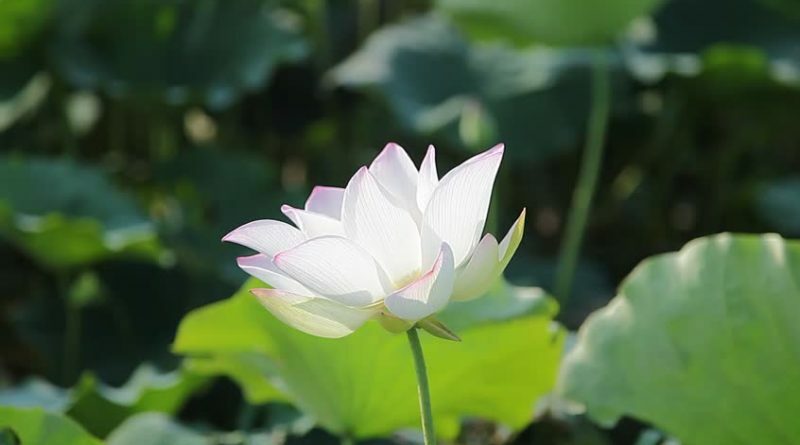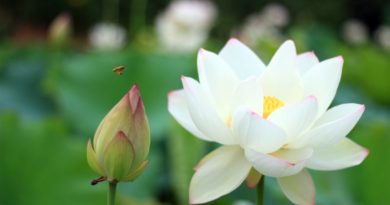Rebirth
[05]
Rebirth
-ooOoo-
Where do beings come from and where are they going?
There are three possible answers to this question. Those who believe in a god or gods usually claim that before an individual is created, he/she does not exist, then he/she comes into being through the will of a god. He/she lives their life and then, according to what they believe or do in their life, they either go to eternal heaven or hell. There are others, humanists and scientists, who claim that the individual comes into being at conception due to natural causes, lives and then at death, ceases to exist. Buddhism does not accept either of these explanations. The first gives rise to many ethical problems If a good god really creates each of us, it is difficult to explain why so many people are born with the most dreadful deformities, or why so many children are miscarried just before birth or are still-born. Another problem with the theistic explanation is that it seems very unjust that a person should suffer eternal pain in hell for 60 or 70 years of non-belief or immoral living. Likewise, 60 or 70 years of good living seems a very small outlay for eternal bliss in heaven. for what he/she did in those years on Earth The second explanation is better than the first and has more scientific evidence to support it but still leaves several important questions unanswered. How can a phenomenon so amazingly complex as consciousness develop from the simple meeting of two cells, the sperm and the egg? And now that parapsychology is a recognised branch of science, phenomena like telepathy are increasingly difficult to fit into the materialistic model of the mind.
Buddhism offers the most satisfactory explanation of where beings come from and where they are going. When we die, the mind, with all the tendencies, preferences, abilities and characteristics that have been developed and conditioned in this life, re-establishes itself in a fertilised egg. Thus the individual grows, is re-born and develops a personality conditioned both by the mental characteristics that have been carried over. And by the new environment, the personality will change and be modified by conscious effort; and conditioning factors like education, parental influence and society and once again at death, re-establishing itself in a new fertilised egg. This process of dying and being reborn will continue until the conditions that cause it, craving and ignorance, cease. When they do, instead of being reborn, the mind attains a state called Nirvana and this is the ultimate goal of Buddhism and the purpose of life.
How does the mind go from one body to another?
Think of it being like radio waves. The radio waves, which are not made up of words and music but energy at different frequencies, are transmitted, travel through space, and attracted to and picked up by the receiver from where they are broadcast as words and music. It is the same with the mind. At death, mental energy travels through space, is attracted to and picked up by the fertilised egg. As the embryo grows, it centres itself in the brain from where it later broadcasts itself as the new personality.
Is one always reborn as a human being?
No, there are several realms in which one can be reborn. Some people are reborn in heaven, some are reborn in hell, some are reborn as hungry ghosts and so on. Heaven is not a place but a state of existence where one has a subtle body and where the mind experiences mainly pleasure. Some religions strive very hard to be reborn in a heavenly existence mistakenly believing it to be a permanent state. But it is not. Like all conditioned states, heaven is impermanent and when one’s life span there is finished, one could well be reborn again as a human. Hell, likewise, is not a place but a state of existence where one has a subtle body and where the mind experiences mainly anxiety and distress. Being a hungry ghost, again, is a state of existence where the body is subtle and where the mind is continually plagued by longing and dissatisfaction.
So heavenly beings experience mainly pleasure, hell beings and ghosts experience mainly pain and human beings experience usually a mixture of both. So the main difference between the human realm and other realms is the body type and the quality of experience.
What decides where we will be reborn?
The most important factor, but not the only one, influencing where we will be reborn and what sort of life we shall have, is karma. The word karma means action and refers to our intentional mental actions. In other words, what we are is determined very much by how we have thought and acted in the past. Likewise, how we think and act now will influence how we will be in the future.
The gentle, loving type of person tends to be reborn in a heaven realm or as a human being who has a predominance of pleasant experiences. The anxious, worried or extremely cruel type of person tends to be reborn in a hell realm or as a human being who has a predominance of painful experiences. The person who develops obsessive craving, fierce longings, and burning ambitions that can never be satisfied tends to be reborn as a hungry ghost or as a human being frustrated by longing and wanting. Whatever mental habits are strongly developed in this life will continue in the next life. Most people, however, are reborn as human beings.
So if our lives are determined by our karma, can we change it?
Of course we can. That is why one of the steps on the Eightfold Path is Right Effort. It depends on our sincerity, how much energy we exert and how strong the habit is. But it is true that some people singly go through life under the influence of their past habits, without making an effort to change them and falling victim to these unpleasant results. Such people will continue to suffer unless they change their negative habits. The longer the negative habits remain, the more difficult they are to change. The Buddhist understands this and takes advantage of each and every opportunity to break mental habits that have unpleasant results and to develop mental habits that have pleasant and happy results. Meditation is one of the techniques used to modify the habit patterns of the mind as does speaking or refraining to speak in certain ways, and acting or refraining to act in certain ways. The whole of the Buddhist life is a training to purify and free the mind. For example, if being patient and kind was a pronounced part of your character in your last life, such tendencies will re-emerge in the present life. If they are strengthened and developed in the present life, they will re-emerge even stronger and more pronounced in the future life. This is based upon the simple and observable fact that long established habits tend to be difficult to break.
Now, when you are patient and kind, it tends to happen that you are not so easily ruffled by others, you don’t hold grudges, people like you and thus your experiences tends to be happier.
Now, let us take another example. Let us say that you come into life with a tendency to be patient and kind due to your mental habits in the past life. But in the present life, you neglect to strengthen and develop such tendencies. They would gradually weaken and die out and perhaps be completely absent in the future life. Patience and kindness being weak in this case, there is a possibility that in either this life or in the next life, a short temper, anger and cruelty could grow and develop, bringing with them all the unpleasant experiences that such attitudes create. We will take one last example. Let us say that due to your mental habits in the last life, you came into the present life with the tendency to be short-tempered and angry, and you realise that such habits only cause you unpleasantness and so you make an effort to change them. You replace them with positive emotions. If you are able to eliminate them completely, which is possible if you make an effort, you become free from the unpleasantness caused by being short tempered and angry. If you are only able to weaken such tendencies, they would re-emerge in the next life where with a bit more effort, they could be eliminated completely and you could be free from their unpleasant effects.
You have talked a lot about rebirth but is there any proof that we will be reborn when we die?
Not only is there scientific evidence to support Buddhist belief in rebirth, it is the only after-life theory that has any evidence to support it. There is not a scrap of evidence to prove the existence of heaven and of course evidence of annihilation at death must be lacking. But during the last 30 years parapsychologists have been studying reports that some people have vivid memories of their former lives. For example, in England, a 5 year old girl said she could remember her other mother and father and she talked vividly about what sounded like the events in the life of another person. Parapsychologists were called in and asked her hundreds of questions to which she gave answers. She spoke of living in a particular village, in what appeared to be Spain. She gave the name of the village, the name of the street she lived in, her neighbours’ names and details about her everyday life there. she also tearfully spoke of how she had been struck by a car and died of her injuries two days later. When these details were checked, they were found to be accurate. There was a village in Spain with the name the child had given. There was a house of the type she had described in the street she had named. What is more, it was found that a 23 year old woman living in the house had been killed in a car accident five years before.
Now how is it possible for a five year old living in England who had never been to Spain to know all these details? And of course, this is not the only case of this type. Professor Ian Stevenson of the University of Virginia’s Department of Psychology has described dozens of cases of this type in his books. He is an accredited scientist whose 25 year study of people who remember former lives is very strong evidence for the Buddhist teaching of rebirth. (See “Twenty Cases Suggestive of Reincarnation and Cases of Reincarnation Type”, University Press of Virginia, Charlotteville, USA, 1975).
Some people might say that the so�called ability to remember former lives is the work of devils.
You simply cannot dismiss everything that doesn’t fit into your belief as being the work of devils.
When cold, hard facts are produced to support an idea, you must use rational and logical arguments if you wish to counter them — not irrational and superstitious talk about devils.
You say that talk about devils is superstitious. Isn’t talk about rebirth a bit superstitious too?
The dictionary defines superstition as a belief which is not based on reason or fact but on an association of ideas, as in magic. If you can show me a careful study of the existence of devils written by a scientist I will concede that belief in devils is not superstition. But I have never heard of any research into devils; scientists simply wouldn’t bother to study such things, so I say there is no evidence for the existence of devils. But as we have just seen, there is evidence which seems to suggest that rebirth does take place. So if belief in rebirth is based on at least some facts, it cannot be a superstition.
Well, have there ever been any scientists who believe in rebirth?
Yes. Thomas Huxley, who was responsible for having science introduced into the 19th century British school system and who was the first scientist to defend Darwin’s theories, believed that reincarnation was a very plausible idea. In his famous book “Evolution and Ethics and other Essays”, he says:
“In the doctrine of transmigration, whatever its origin, Brahmanical and Buddhist speculation found, ready to hand, the means of constructing a plausible vindication of the ways of the Cosmos to man….yet this plea of justification is not less plausible than others; and none but very hasty thinkers will reject it on the ground of inherent absurdity. Like the doctrine of evolution itself, that of transmigration has its roots in the world of reality; and it may claim such support as the great argument from analogy is capable of supplying“.
Then, Professor Gust Stromberg, the famous Swedish astronomer, physicist and friend of Einstein also found the idea of rebirth appealing:
“Opinions differ whether human souls can be reincarnated on the earth or not. In 1936 a very interesting case was thoroughly investigated and reported by the government authorities in India. A girl (Shanti Devi from Deli) could accurately describe her previous life (at Muttra, five hundred miles from Deli) which ended about a year before her ‘second birth’. She gave the name of her husband and child and described her home and life history. The investigating commission brought her to her former relatives, who verified all her statements. Among the people of India reincarnations are regarded as commonplace; the astonishing thing for them in this case was the great number of facts the girl remembered. This and similar cases can be regarded as additional evidence for the theory of the indestructibility of memory“.
Professor Julian Huxley, the distinguished British scientist who was Director General of UNESCO believed that rebirth was quite in harmony with scientific thinking:
“There is nothing against a permanently surviving spirit-individuality being in some way given off at death, as a definite wireless message is given off by a sending apparatus working in a particular ways. But it must be remembered that the wireless message only becomes a message again when it comes in contact with a new, material structure – the receiver. So with our possible spirit-emanation. It would never think or feel unless again “embodied” in some way. our personalities are so based on body that it is really impossible to think of survival which would be in any true sense personal without a body of sorts. I can think of something being given off which could bear the same relation to men and women as a wireless message to the transmitting apparatus for mind“.
Even very practical and down-to-earth people like the American industrialist Henry Ford found the idea of rebirth acceptable. Ford was attracted to the idea of rebirth because, unlike the theistic idea or the materialistic idea, rebirth gives you a second chance to develop yourself. Henry Ford says:
“I adopted the theory of Reincarnation when I was twenty six. Religion offered nothing to the point. Even work could not give me complete satisfaction. Work is futile if we cannot utilise the experience we collect in one life in the next. When I discovered Reincarnation it was as if I had found a universal plan I realised that there was a chance to work out my ideas. Time was no longer limited. I was no longer a slave to the hands of the clock. Genius is experience. Some seem to think that it is a gift or talent, but it is the fruit of long experience in many lives. Some are older souls than others, and so they know more. The discovery of Reincarnation put my mind at ease. If you preserve a record of this conversation, write it so that it puts men’s minds at ease. I would like to communicate to others the calmness that the long view of life gives to us“.
So the Buddhist teachings of rebirth does have some scientific evidence to support it. It is logically consistent and it goes a long way in answering questions what the theistic and the materialistic theories fail to . It is also very comforting. What can be worse than a theory of life that gives you no second chance, no opportunity to amend the mistakes you have made in this life and no time to further develop the skills and abilities you have nurtured in this life. But according to the Buddha, if you fail to attain Nirvana in this life, you will have the opportunity to try again next time. If you have made mistakes in this life, you will be able to correct yourself in the next life. You will truly be able to learn from your mistakes. Things you were unable to do or achieve in this life may well become possible in the next life. What a wonderful teaching!







